|
"This is the best activity period I ever had," the seventh
grader nearest me was whispering to his friend. Both were
coated in that wide-eyed wonder and overwhelming respect
thirteen-year-olds wear when they find themselves in reach
of their heroes. But the three men addressing my band of
a dozen eager listeners weren't basketball stars, football
quarterbacks, or even Nascar drivers. They were fly fishermen.
Greg, the president of the local Trout Unlimited chapter,
was in my Library Media Center talking with my Friday Activity
Group while retirees Marshall and Jim placed vises, bobbins,
chenille, feathers, and dubbing needles on the tables in front
of each of the boys. Every time they added a fly tying component,
the excitement grew, traveling like a domino chain along my students.
They were too awed to speak until Greg asked them a question
directly.
"Has anyone ever fished the pond out behind the athletic fields?"
He opened the door. A hand shot up.
"I have," one beamed.
"How'd it go?" Greg asked.
"It was a great fish," my eager seventh grader said.
"Did you release it?" Greg asked gently. He had already
established a rapport which allowed my student to be honest.
"Well, it died," he admitted. "It swallowed the hook real deep."
Greg was patient and artfully crafted the teachable moment.
The pond out back, he told them, was their pond. Through an
agreement with the town, it's stocked every year with rainbows
for kids up to age sixteen to catch.
"So," he told them, "I'm glad you guys are here today. It's
your pond and it's up to you to take care of it. One of the
ways you can make sure there are trout to catch all season
is by learning to fly fish. The trout won't swallow your fly
and you can release them so that you can catch them again
another day."
"And," he told them," that pond is special because adults
can't fish it unless they're teaching a child, so you can
politely ask adults you see there without children not to
take your trout."
My students glowed. It was like having a clubhouse, only better.
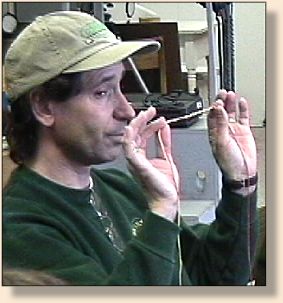 By that time, the fly tying materials were arranged. Greg
demonstrated tying a large woolly bugger under the intense
scrutiny of twelve sets of serious eyes. Then, he split
the group with Marshall and Jim, and the three showed their
young disciples how to pinch the barb down in the jaws of
the vise, then how to carefully secure the hook in the vise
for fly tying. Three tables of future fly anglers concentrated
on thread and hooks and feathers, as if each step was a test
they had to pass. Occasionally bobbins were backed up and
helping hands reached in and guided the progress, but, in the
end, twelve new flies were created, and twelve boys had
changed. They were jubilant!
By that time, the fly tying materials were arranged. Greg
demonstrated tying a large woolly bugger under the intense
scrutiny of twelve sets of serious eyes. Then, he split
the group with Marshall and Jim, and the three showed their
young disciples how to pinch the barb down in the jaws of
the vise, then how to carefully secure the hook in the vise
for fly tying. Three tables of future fly anglers concentrated
on thread and hooks and feathers, as if each step was a test
they had to pass. Occasionally bobbins were backed up and
helping hands reached in and guided the progress, but, in the
end, twelve new flies were created, and twelve boys had
changed. They were jubilant!
As happens in school, the bell rang. The group and the moment
were gone. I noticed that every one of the students took the
handouts Marshall had made. Greg, Marshall, and Jim were gone,
too, when the first of my teaching colleagues came in. Two
others soon followed, all with the same happy report. When
the twelve new fly tiers dispersed to their 7th period classes,
these teachers had noticed their awkward pride, and had encouraged
them to show the other students their creations and explain what
had happened. Boys who were normally shy and maybe just a little
outside of the mainstream of junior high popularity became heroes
themselves for a moment. Self esteem is, in fact, earned, not
learned.
A week later, a very long week if you're thirteen, my fingerlings
were back in the Library. Marshall and Jim arrived early with
two wooden boxes. Step two. My guys were going to learn to
cast a fly rod.
In the mandated wisdom that accompanies the construction of large
additions to schools such as ours, a settling lagoon for the new
paved parking lot had been built right outside my library window.
It has small banks rising all around to an encircling grassy
platform and is roughly one hundred feet from any obstruction.
A casting pool.
The kids led the way out the door at the bottom of the stairwell
to the nearest bank. Marshall and Jim laid the boxes in their
midst and opened them. In the briefcase, secured in circular
cutouts in the foam lining, were six reels. Three were marked
"5," three were marked "6." Rod sacks emerged from the longer
box, enough for the boys to share them in teams of two. Jim
showed them how to put the butt and tip together, and Marshall
showed them how to read the length and line weight of each rod,
and match the 5 weights with a reel marked "5," the 6 weights
with the others.
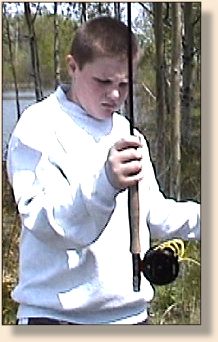 There was a happy confusion as rods were assembled, reels affixed,
some reels discovered to be left-handed and re-affixed the other
way, and pairs of would-be anglers tromped off around the high
lawn of the casting embankment. They staked out territory as
if there really might be fish waiting below. This was joyous
but serious stuff.
There was a happy confusion as rods were assembled, reels affixed,
some reels discovered to be left-handed and re-affixed the other
way, and pairs of would-be anglers tromped off around the high
lawn of the casting embankment. They staked out territory as
if there really might be fish waiting below. This was joyous
but serious stuff.
Marshall and Jim, soon joined by Greg, circulated among their
young charges. They demonstrated occasionally, but mostly
coaxed, guided, and praised. The sounds of snapping backcasts
gradually diminished. Leaders falling in heaps finally stretched
out to the center of the pool. Elbows learned their places;
wrists relaxed and learned theirs.
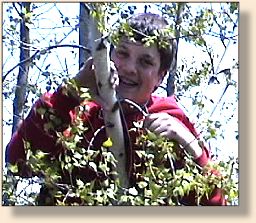
Suddenly, there was a long, gentle cast that led straight out
from a young angler's rod and nearly touched the farther shore.
He looked up in amazement and saw the appreciative eyes of
all of his peers. He smiled.
"You're a natural," Jim told him, the highest possible compliment,
words that lift the heart of a thirteen-year-old beyond the
mortal world. Hogwarts School of Rodcasting?
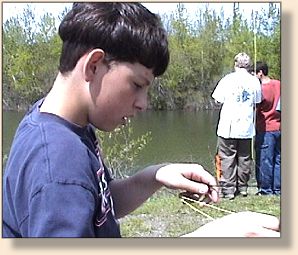 The tyranny of the school bell system was silently looming over
us as we hustled the boys back to the storage boxes and they
practiced dismantling and stowing their gear. They were
downright giddy, chatty and emboldened with success.
The tyranny of the school bell system was silently looming over
us as we hustled the boys back to the storage boxes and they
practiced dismantling and stowing their gear. They were
downright giddy, chatty and emboldened with success.
"How much does one of these rods cost?" one asked. He had
brought his own fly rod along and had learned a practical
lesson in side-by-side comparison. "They sure cast easier
than mine!"
"Oh, I think your rod will catch fish," Marshall reassured
him. "These are a little expensive, but you can probably
get a beginner set up at a discount store".
"They're $39.95 there," another boy piped in, then added wisely,
"And they won't take $29.95 for them, even if that's all you
brought with you." The voice of experience, obviously.
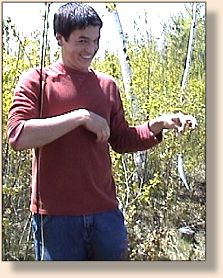 "Well," Marshall told them. "You could earn that much washing
cars, you know."
"Well," Marshall told them. "You could earn that much washing
cars, you know."
"Hey, Ms. Scott, how's your car?" twelve boys asked, smiling
from ear to ear. I made a note, somewhere in the corner of
my heart, to see what I could do about getting each one of
them their own rod. There's always a way. If you have
students who want to learn, there's no choice but to try
to make it happen.
The boys sat down poolside while Greg walked back down
to the shore to re-cap. Other students were coming by
from the soccer activity, the kickball activity, and from
the track. They called out to some of my boys, but there
was no response. Greg was demonstrating a roll cast, which
stretched effortlessly across the parking lot lagoon to the
farthest shore, and twelve sets of eyes were glued on the fly.
"Wow," one of my students whispered, and the other eleven agreed.
~ Kathy Scott
About Kathy:
Kathy noted in her first contacts with us that interest in kids' programs have
really picked up in Maine. She says, "You are absolutely correct in saying the
folks at the state level are helpful and appreciate the interest. I've
also found our local chapter of TU very receptive, as well as the assorted
Registered Maine Guides and the local fly shops. At the National level,
Greg Ponte received TU's "Distinguished Service Award" for kids outreach
work in Maine, and middle schools are becoming so interested I received an
"Exemplary Practice" award from the Maine Associate of Middle Level
Educators for my program for 7th and 8th graders. Gred, Tim Soule
(a member of FAOL) and I presented at the state middle school teachers'
conference this fall."
Kathy is also the author of Moose in the Water Bamboo on the Bench,
reviewed in our Book Review section (it's really delightful). She welcomes
contact from others wanting to set up a similar program in their
schools. She is a full-time teacher, you can reach her by email
at:
dpvbkjs@tdstelme.net
|

 By that time, the fly tying materials were arranged. Greg
demonstrated tying a large woolly bugger under the intense
scrutiny of twelve sets of serious eyes. Then, he split
the group with Marshall and Jim, and the three showed their
young disciples how to pinch the barb down in the jaws of
the vise, then how to carefully secure the hook in the vise
for fly tying. Three tables of future fly anglers concentrated
on thread and hooks and feathers, as if each step was a test
they had to pass. Occasionally bobbins were backed up and
helping hands reached in and guided the progress, but, in the
end, twelve new flies were created, and twelve boys had
changed. They were jubilant!
By that time, the fly tying materials were arranged. Greg
demonstrated tying a large woolly bugger under the intense
scrutiny of twelve sets of serious eyes. Then, he split
the group with Marshall and Jim, and the three showed their
young disciples how to pinch the barb down in the jaws of
the vise, then how to carefully secure the hook in the vise
for fly tying. Three tables of future fly anglers concentrated
on thread and hooks and feathers, as if each step was a test
they had to pass. Occasionally bobbins were backed up and
helping hands reached in and guided the progress, but, in the
end, twelve new flies were created, and twelve boys had
changed. They were jubilant! There was a happy confusion as rods were assembled, reels affixed,
some reels discovered to be left-handed and re-affixed the other
way, and pairs of would-be anglers tromped off around the high
lawn of the casting embankment. They staked out territory as
if there really might be fish waiting below. This was joyous
but serious stuff.
There was a happy confusion as rods were assembled, reels affixed,
some reels discovered to be left-handed and re-affixed the other
way, and pairs of would-be anglers tromped off around the high
lawn of the casting embankment. They staked out territory as
if there really might be fish waiting below. This was joyous
but serious stuff.
 The tyranny of the school bell system was silently looming over
us as we hustled the boys back to the storage boxes and they
practiced dismantling and stowing their gear. They were
downright giddy, chatty and emboldened with success.
The tyranny of the school bell system was silently looming over
us as we hustled the boys back to the storage boxes and they
practiced dismantling and stowing their gear. They were
downright giddy, chatty and emboldened with success. "Well," Marshall told them. "You could earn that much washing
cars, you know."
"Well," Marshall told them. "You could earn that much washing
cars, you know."